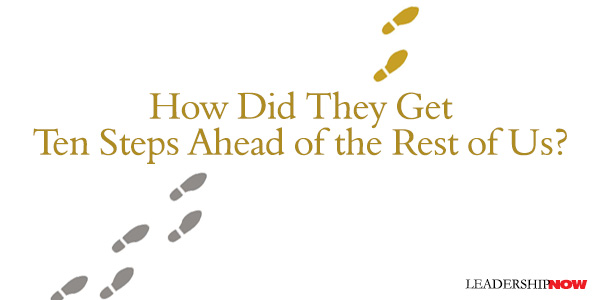 |
 |
03.15.11

How Did They Get Ten Steps Ahead of the Rest of Us?
ERIK CALONIUS wants to know what makes a visionary? What allows a Steve Jobs, Walt Disney, Berry Gordy, John Lennon, Richard Branson, and others like them, to do what they do? How do they see what the rest of us are missing? Blending cognitive psychology, neuroscience and (mostly) first-hand accounts of the visionary’s life, in Ten Steps Ahead, he builds a picture of what makes them tick. He identifies the importance of intuition and emotional intelligence and the role of courage and conviction in separating visionaries from mere dreamers.“Visionaries don’t succeed by lying in bed with their dreams floating idly by above their heads. They get out into the world and experience things, and from that, shape their ideas.” It’s being a first-class noticer as Warren Bennis suggested. Calonius cites Thomas Kuhn’s work on paradigm shifts and the years of “mopping up” that follow them. Julian Huxley wrote in 1957, “Once science has reached the stage of having a coherent theoretical basis, it will inevitably proceed … to make further discoveries and further extension of its theory.” Calonius explains: That’s why commercial products often follow scientific breakthroughs by about 20 years or so. … “First movers,” in other words (and contrary to the mantra of the “New Economy” of the late 1990s), very often do not prevail. This means you don’t need to deliver the paradigm to mop up quite successfully in its aftermath. You don’t even need to be the first mover. Just be clever enough to make off with the flotsam of the paradigm after it has crashed upon the shore. The reoccurring insight I find in these pages is that it really comes down to the ability (and confidence) to walk a fine line, to develop a balance of thought. For example, pattern recognition allows visionaries to make connections and see what is not yet seen. Yet at the same time, pattern recognition can lock us into a constrained view of life of our own making. “The same patterns that help us predict the future are also the ones that lock us into the present.” Calonius observes, “Intuition is essential to the visionary. Visionaries almost always work at the edge of our understanding, where information is scarce or nonexistent and where intuitive decisions are often the only choice.” But again, there’s a balance. If we follow our intuition blindly, we can lose it all. “Intuition is a judgment call” that must be developed. “Practiced insight, leavened with intuition.” Emotional intelligence is also an important element. It is “that rare balance between dry logic and emotional intuition.” It gives the visionary the ability to read others, and thereby be able to rally others behind their idea. Of course, luck plays a part. In The Drunkard’s Walk, Leonard Mlodinow writes, “Keep marching forward because the best news is that since chance does play a role, one important factor in success is under our control: the number of at-bats, the number of chances taken, the number of opportunities seized.” One of the greatest challenges to visionaries—indeed all of us—says Calonius, is “to get outside the walls, to rise over the yes-men and sycophants and even their confidence in their own ideas, to be able to see clearly.” Visionaries are all around us. The brain is remarkable in that it is an ever-changing network of circuitry that learns as we live our lives. We can guide that process to, as Joseph LeDoux says, “transcend our genes.” We can be visionaries too. Visionaries keep “running forward, adjusting their ambition along the way.” 
Posted by Michael McKinney at 10:08 PM
|
BUILD YOUR KNOWLEDGE
 

How to Do Your Start-Up Right STRAIGHT TALK FOR START-UPS 
Grow Your Leadership Skills NEW AND UPCOMING LEADERSHIP BOOKS 
Leadership Minute BITE-SIZE CONCEPTS YOU CAN CHEW ON 
Classic Leadership Books BOOKS TO READ BEFORE YOU LEAD |